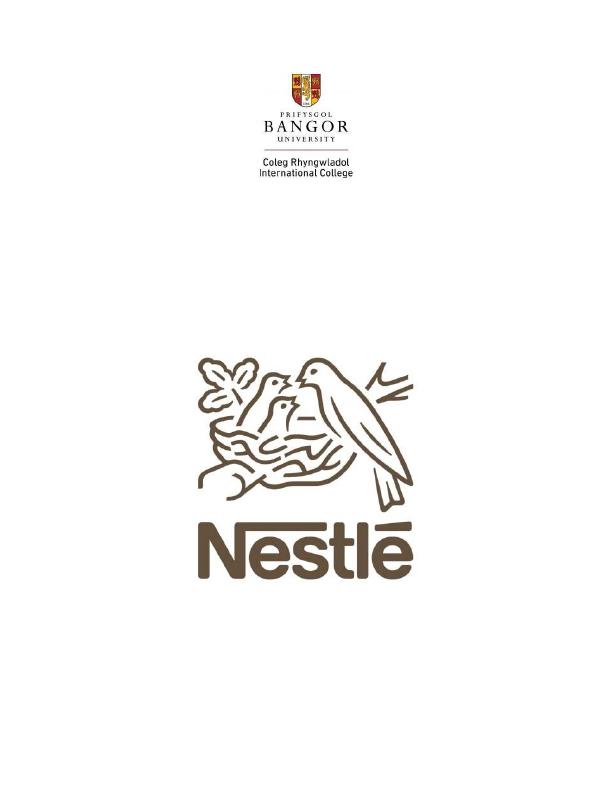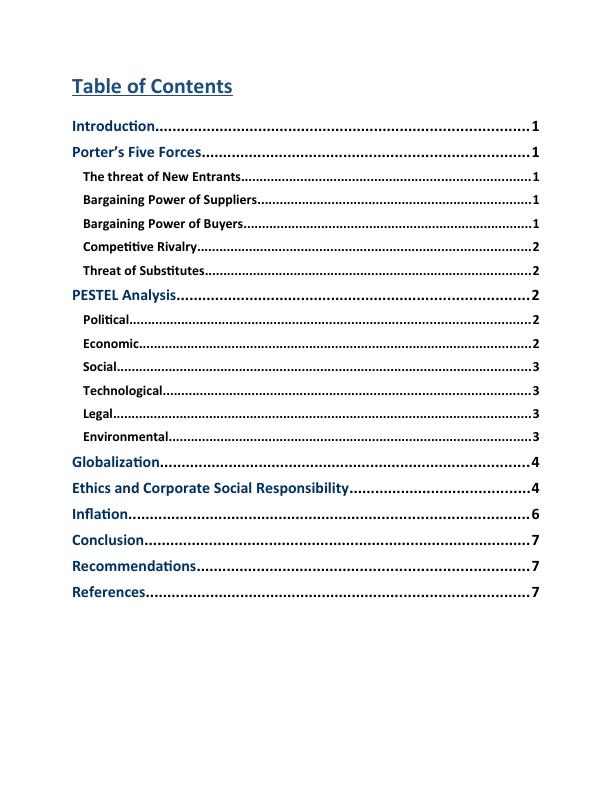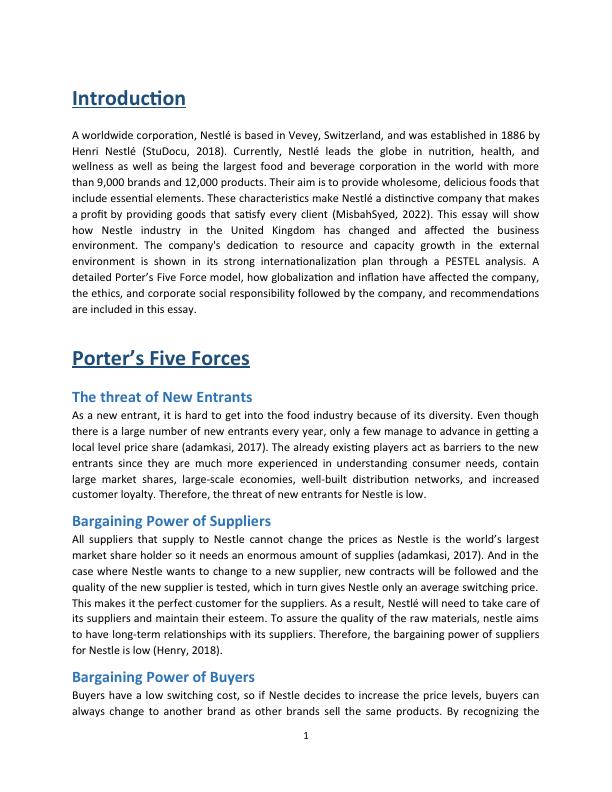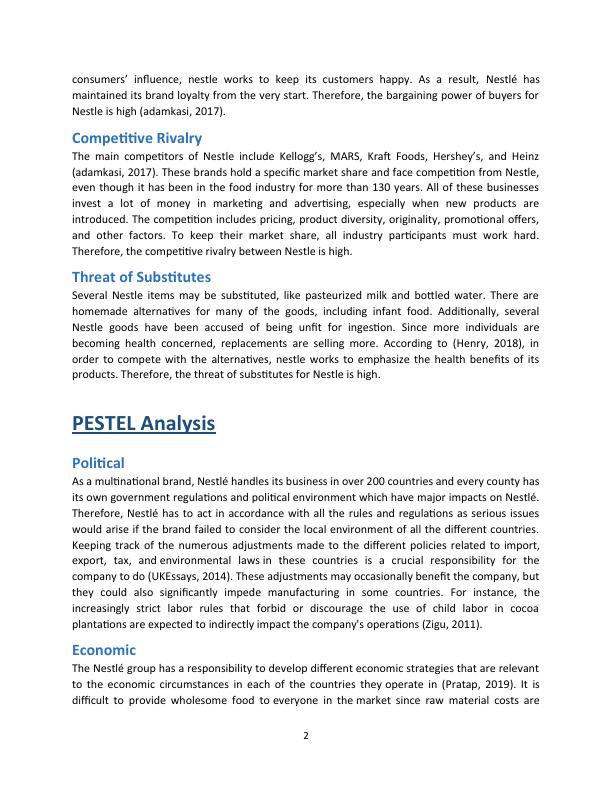Nestle Industry in the UK: A Comprehensive Analysis
11 Pages3359 Words99 Views
Added on 2023-01-13
About This Document
This essay provides a comprehensive analysis of Nestle industry in the UK, including Porter's Five Forces, PESTEL analysis, globalization, ethics, and inflation. It examines the impact of these factors on the business environment and offers recommendations for Nestle.
Nestle Industry in the UK: A Comprehensive Analysis
Added on 2023-01-13
ShareRelated Documents

Table of Contents
Introduction.......................................................................................1
Porter’s Five Forces............................................................................1
The threat of New Entrants..............................................................................1
Bargaining Power of Suppliers..........................................................................1
Bargaining Power of Buyers..............................................................................1
Competitive Rivalry..........................................................................................2
Threat of Substitutes........................................................................................2
PESTEL Analysis..................................................................................2
Political............................................................................................................2
Economic..........................................................................................................2
Social................................................................................................................3
Technological...................................................................................................3
Legal.................................................................................................................3
Environmental..................................................................................................3
Globalization......................................................................................4
Ethics and Corporate Social Responsibility..........................................4
Inflation.............................................................................................6
Conclusion..........................................................................................7
Recommendations.............................................................................7
References.........................................................................................7
Introduction.......................................................................................1
Porter’s Five Forces............................................................................1
The threat of New Entrants..............................................................................1
Bargaining Power of Suppliers..........................................................................1
Bargaining Power of Buyers..............................................................................1
Competitive Rivalry..........................................................................................2
Threat of Substitutes........................................................................................2
PESTEL Analysis..................................................................................2
Political............................................................................................................2
Economic..........................................................................................................2
Social................................................................................................................3
Technological...................................................................................................3
Legal.................................................................................................................3
Environmental..................................................................................................3
Globalization......................................................................................4
Ethics and Corporate Social Responsibility..........................................4
Inflation.............................................................................................6
Conclusion..........................................................................................7
Recommendations.............................................................................7
References.........................................................................................7

Introduction
A worldwide corporation, Nestlé is based in Vevey, Switzerland, and was established in 1886 by
Henri Nestlé (StuDocu, 2018). Currently, Nestlé leads the globe in nutrition, health, and
wellness as well as being the largest food and beverage corporation in the world with more
than 9,000 brands and 12,000 products. Their aim is to provide wholesome, delicious foods that
include essential elements. These characteristics make Nestlé a distinctive company that makes
a profit by providing goods that satisfy every client (MisbahSyed, 2022). This essay will show
how Nestle industry in the United Kingdom has changed and affected the business
environment. The company's dedication to resource and capacity growth in the external
environment is shown in its strong internationalization plan through a PESTEL analysis. A
detailed Porter’s Five Force model, how globalization and inflation have affected the company,
the ethics, and corporate social responsibility followed by the company, and recommendations
are included in this essay.
Porter’s Five Forces
The threat of New Entrants
As a new entrant, it is hard to get into the food industry because of its diversity. Even though
there is a large number of new entrants every year, only a few manage to advance in getting a
local level price share (adamkasi, 2017). The already existing players act as barriers to the new
entrants since they are much more experienced in understanding consumer needs, contain
large market shares, large-scale economies, well-built distribution networks, and increased
customer loyalty. Therefore, the threat of new entrants for Nestle is low.
Bargaining Power of Suppliers
All suppliers that supply to Nestle cannot change the prices as Nestle is the world’s largest
market share holder so it needs an enormous amount of supplies (adamkasi, 2017). And in the
case where Nestle wants to change to a new supplier, new contracts will be followed and the
quality of the new supplier is tested, which in turn gives Nestle only an average switching price.
This makes it the perfect customer for the suppliers. As a result, Nestlé will need to take care of
its suppliers and maintain their esteem. To assure the quality of the raw materials, nestle aims
to have long-term relationships with its suppliers. Therefore, the bargaining power of suppliers
for Nestle is low (Henry, 2018).
Bargaining Power of Buyers
Buyers have a low switching cost, so if Nestle decides to increase the price levels, buyers can
always change to another brand as other brands sell the same products. By recognizing the
1
A worldwide corporation, Nestlé is based in Vevey, Switzerland, and was established in 1886 by
Henri Nestlé (StuDocu, 2018). Currently, Nestlé leads the globe in nutrition, health, and
wellness as well as being the largest food and beverage corporation in the world with more
than 9,000 brands and 12,000 products. Their aim is to provide wholesome, delicious foods that
include essential elements. These characteristics make Nestlé a distinctive company that makes
a profit by providing goods that satisfy every client (MisbahSyed, 2022). This essay will show
how Nestle industry in the United Kingdom has changed and affected the business
environment. The company's dedication to resource and capacity growth in the external
environment is shown in its strong internationalization plan through a PESTEL analysis. A
detailed Porter’s Five Force model, how globalization and inflation have affected the company,
the ethics, and corporate social responsibility followed by the company, and recommendations
are included in this essay.
Porter’s Five Forces
The threat of New Entrants
As a new entrant, it is hard to get into the food industry because of its diversity. Even though
there is a large number of new entrants every year, only a few manage to advance in getting a
local level price share (adamkasi, 2017). The already existing players act as barriers to the new
entrants since they are much more experienced in understanding consumer needs, contain
large market shares, large-scale economies, well-built distribution networks, and increased
customer loyalty. Therefore, the threat of new entrants for Nestle is low.
Bargaining Power of Suppliers
All suppliers that supply to Nestle cannot change the prices as Nestle is the world’s largest
market share holder so it needs an enormous amount of supplies (adamkasi, 2017). And in the
case where Nestle wants to change to a new supplier, new contracts will be followed and the
quality of the new supplier is tested, which in turn gives Nestle only an average switching price.
This makes it the perfect customer for the suppliers. As a result, Nestlé will need to take care of
its suppliers and maintain their esteem. To assure the quality of the raw materials, nestle aims
to have long-term relationships with its suppliers. Therefore, the bargaining power of suppliers
for Nestle is low (Henry, 2018).
Bargaining Power of Buyers
Buyers have a low switching cost, so if Nestle decides to increase the price levels, buyers can
always change to another brand as other brands sell the same products. By recognizing the
1

consumers’ influence, nestle works to keep its customers happy. As a result, Nestlé has
maintained its brand loyalty from the very start. Therefore, the bargaining power of buyers for
Nestle is high (adamkasi, 2017).
Competitive Rivalry
The main competitors of Nestle include Kellogg’s, MARS, Kraft Foods, Hershey’s, and Heinz
(adamkasi, 2017). These brands hold a specific market share and face competition from Nestle,
even though it has been in the food industry for more than 130 years. All of these businesses
invest a lot of money in marketing and advertising, especially when new products are
introduced. The competition includes pricing, product diversity, originality, promotional offers,
and other factors. To keep their market share, all industry participants must work hard.
Therefore, the competitive rivalry between Nestle is high.
Threat of Substitutes
Several Nestle items may be substituted, like pasteurized milk and bottled water. There are
homemade alternatives for many of the goods, including infant food. Additionally, several
Nestle goods have been accused of being unfit for ingestion. Since more individuals are
becoming health concerned, replacements are selling more. According to (Henry, 2018), in
order to compete with the alternatives, nestle works to emphasize the health benefits of its
products. Therefore, the threat of substitutes for Nestle is high.
PESTEL Analysis
Political
As a multinational brand, Nestlé handles its business in over 200 countries and every county has
its own government regulations and political environment which have major impacts on Nestlé.
Therefore, Nestlé has to act in accordance with all the rules and regulations as serious issues
would arise if the brand failed to consider the local environment of all the different countries.
Keeping track of the numerous adjustments made to the different policies related to import,
export, tax, and environmental laws in these countries is a crucial responsibility for the
company to do (UKEssays, 2014). These adjustments may occasionally benefit the company, but
they could also significantly impede manufacturing in some countries. For instance, the
increasingly strict labor rules that forbid or discourage the use of child labor in cocoa
plantations are expected to indirectly impact the company's operations (Zigu, 2011).
Economic
The Nestlé group has a responsibility to develop different economic strategies that are relevant
to the economic circumstances in each of the countries they operate in (Pratap, 2019). It is
difficult to provide wholesome food to everyone in the market since raw material costs are
2
maintained its brand loyalty from the very start. Therefore, the bargaining power of buyers for
Nestle is high (adamkasi, 2017).
Competitive Rivalry
The main competitors of Nestle include Kellogg’s, MARS, Kraft Foods, Hershey’s, and Heinz
(adamkasi, 2017). These brands hold a specific market share and face competition from Nestle,
even though it has been in the food industry for more than 130 years. All of these businesses
invest a lot of money in marketing and advertising, especially when new products are
introduced. The competition includes pricing, product diversity, originality, promotional offers,
and other factors. To keep their market share, all industry participants must work hard.
Therefore, the competitive rivalry between Nestle is high.
Threat of Substitutes
Several Nestle items may be substituted, like pasteurized milk and bottled water. There are
homemade alternatives for many of the goods, including infant food. Additionally, several
Nestle goods have been accused of being unfit for ingestion. Since more individuals are
becoming health concerned, replacements are selling more. According to (Henry, 2018), in
order to compete with the alternatives, nestle works to emphasize the health benefits of its
products. Therefore, the threat of substitutes for Nestle is high.
PESTEL Analysis
Political
As a multinational brand, Nestlé handles its business in over 200 countries and every county has
its own government regulations and political environment which have major impacts on Nestlé.
Therefore, Nestlé has to act in accordance with all the rules and regulations as serious issues
would arise if the brand failed to consider the local environment of all the different countries.
Keeping track of the numerous adjustments made to the different policies related to import,
export, tax, and environmental laws in these countries is a crucial responsibility for the
company to do (UKEssays, 2014). These adjustments may occasionally benefit the company, but
they could also significantly impede manufacturing in some countries. For instance, the
increasingly strict labor rules that forbid or discourage the use of child labor in cocoa
plantations are expected to indirectly impact the company's operations (Zigu, 2011).
Economic
The Nestlé group has a responsibility to develop different economic strategies that are relevant
to the economic circumstances in each of the countries they operate in (Pratap, 2019). It is
difficult to provide wholesome food to everyone in the market since raw material costs are
2

End of preview
Want to access all the pages? Upload your documents or become a member.
Related Documents
Five Forces Analysis of Kitkatlg...
|7
|1324
|1203
Porter Five Force Analysis for Nestlelg...
|5
|826
|498
Challenges and Mistakes of E-business Approacheslg...
|11
|2562
|351
Operation Management in Nestle company - Reportlg...
|11
|2602
|615
Analysis of Specialty Coffee Café Industry using Porter’s Five Forces and Macroenvironmental Analysislg...
|6
|1012
|316
Competitive Strategylg...
|10
|1741
|270
